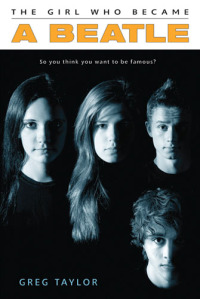
Published by Feiwel & Friends on February 15, 2011
The prologue to The Girl Who Became a Beatle contains an apt warning: the novel is a fantasy that requires a willingness to suspend disbelief, to accept the possibility of magic in a fictional universe. If you only like stories that are reality-based, this isn't the novel for you.
Regina is the sixteen-year-old lead vocalist for a pop band called the Caverns. She's in love with Julian, the lead guitarist, but hasn't told him. She's worried that the band is about to break up. She misses her absent mother; she wants to run away. Then one night, after making a wish for fame, she wakes up in a world where the Beatles never existed and the Caverns have soared to dizzying heights of popularity by recording Beatles songs (supposedly written by Regina). As she steps into this world, Regina discovers that fame has changed both her life (which now includes a Brad Pitt type boyfriend) and her personality (she's viewed as something of a diva). As she ponders her new life, she is forced to confront her feelings about her mother, Julian, and (most importantly) herself.
The Girl Who Became a Beatle is like comfort food: familiar, predictable, easy to devour, and maybe even a little nutritious. The novel purports to teach life lessons, all of them pretty obvious: Life is what you make it. True friends are better than adoring fans. Be careful what you wish for. Believe in yourself.
The novel is written in the first person, from Regina's perspective. Its use of punchy sentences and short chapters make it a quick read. Whether the novel will succeed with its young adult target audience is unclear to me. I think it depends upon whether readers accept the narrative voice as authentic; whether they believe it belongs to a sixteen-year-old girl. I'm not part of the target audience (being old enough to remember watching The Beatles perform live on the Ed Sullivan Show) and about the only teenage girls I see these days are at the mall during my infrequent shopping trips, but to my unschooled ear, the narrator's voice seemed to be that of an adult male pretending to be a sixteen-year-old girl. I can't say that made much of a difference to me after I settled into the story, but if teenagers and young adults don't accept the voice as genuine, they might be turned off by the novel. I'd be interested to learn the reactions of members of the target audience in that regard.
Speaking from the perspective of a mature (okay, old) male, I enjoyed the novel more than I thought I would. It will never be mistaken for great literature, but as much as I crave gourmet meals, I'm also a sucker for comfort food. The story delivers solid entertainment and the characters are easy to like.
RECOMMENDED